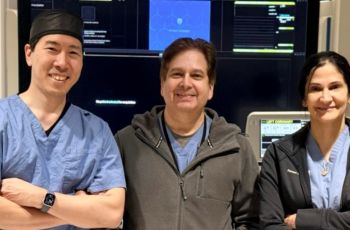
WASHINGTON (Sept. 17, 2013) – Matthew Colonnese, Ph.D., assistant professor of pharmacology and physiology at the George Washington University School of Medicine and Health Sciences, was awarded a $1,973,645 grant from the National Eye Institute to study developmental origins of wakefulness in the cerebral cortex, the region of the brain responsible for cognition and perception.
His project, titled “Emergence of Visual Alertness in Cortical Networks,” will determine how circuit properties and computational structures change in the cerebral cortex between the fetal and postnatal periods.
“There is a big shift in the way the brain operates between the fetal period and immediate postnatal period,” said Colonnese. “The fetal brain appears to be incapable of processing sensory information until just before birth – we are studying the mechanism of this critical shift.”
Colonnese and his research team are studying rats, which he has shown in previous research undergo the same change in activity patterns as humans. By studying rats, Colonnese and his research team hope to define exactly which elements of the brain circuitry are not functional during the fetal period and why they “come online” during the postnatal period. They are focusing on the neuromodulatory systems that regulate sleep and waking, and will see if these are absent or used differently in the young brain.
“We believe that what’s happening during the fetal period is that the brain is in a sort of ‘supersleep,’” said Colonnese. “Even when the body of a preterm infant or fetus looks as if it’s awake, the brain is not processing information and is not truly awake.”
While it has been known for decades that the brain activity of human preterm and neonatal infants is very different from even three to four month old infants, the significance of these differences for brain function remains unknown. How, why and when fetal brain activity patterns mature to become adult brain activities has yet to be explained. This research will lead to better understanding of the critical developmental checkpoints which determine if an infant will develop a healthy, functional brain and how medicine might intervene in a number of conditions which disrupt these checkpoints, such as hypoxia, preterm infancy, or neurodevelopmental disorders.


